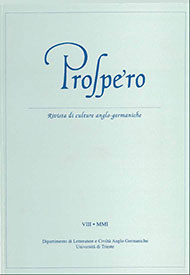2001 / 8 Prospero. Rivista di culture anglo-germaniche
Permanent URI

Scarica il numero completo della rivista / Download issue full text
CONTENTS / SOMMARIO
Bonacci Giulio
A City of the Mind: Ciaran Carson's Belfast
De Biasio Giordano
Nathanael West e l'insostenibile pesantezza dell'essere
Di Bari Marcello
La maschera e il racconto : strategie d'identità nella narrativa di Katherine Mansfield
Mazzadi Patrizia
Prologo e digressioni nel Tristano di Gottfried von Straßburg
Bortolan Pirona Cecilia
Ilse Aichinger, eine Schriftstellerin auf der Sprachsuche
Vanon Alliata Michela
Travel as Epiphany : Henry James and the Geography of the Soul
Bonnetain Yvonne S., Dallapiazza Micheal, Pedersen E.Martin, Putz Martin, Rossi Luca
Recensioni, Reviews, Rezensionen
